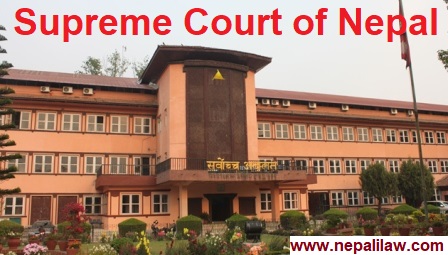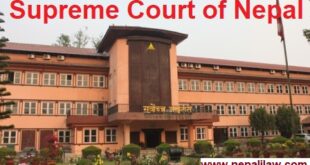The Supreme Court orders to give citizenship in only mother’s name. A joint bench of Justices Deepak Kumar Karki and Hari Prasad Phuyal issued an order in the name of the District Administration Office, Kathmandu.
The Supreme Court’s verdict states that the child has the right to choose the family name of either the mother or the father, it is not compulsory to take both name.
The full text of the decision dated on August 8, 2021 states, “As the petitioner has the right to choose the family name, the identity of both the mother and father has been revealed from other documents submitted with the application.”
Based on the evidence that both father and mother are Nepali, the Supreme Court has ordered to grant citizenship to Tanisi Chand on the basis of descent. One of the provisions of the constitution states that if the mother or father is Nepali, the citizenship of the descendant can be obtained. Another provision stipulates that in order to grant citizenship only from the mother’s identity, mother’s name and sure name, the father must not have been identified.
The court has ordered to keep only the mother’s name in the citizenship certificate as the identity of the father has also been revealed in Tanisi chand’s case.
Tanisi did not want to mention her father’s name in the citizenship certificate, but the court said his wishes should be respected. In her writ petition, Chand has mentioned that she was abandoned by her father as a child. Her father has gone away from them when she was a early child. Her mother has take care, provide education and all facilities alone, therefor she did not want to mention her father’s name in her citizenship certificate.
Further stated that the documents of her parents’ divorce in 2065 BS revealed that her father was a Nepali, the court ordered to grant citizenship by mentioning only her mother’s name.
Bench said that “Citizenship is an important document for the state to issue the identity of its citizens and to obtain the rights granted by the state, including the identification of the person’s relationship,”
Petitioner Chand also said that she has the right to choose the family of her mother or father and insisted that she would not take the citizenship certificate in the name of her father whom she had never met. She did not get take care and love of her fathers’. In January 2077, she first went to the ward office for a recommendation to apply for citizenship. The ward made a recommendation, but the district administration office, Kathmandu refused to grant citizenship in the mother’s name. She then filed a writ petition in the Supreme Court.
See hear full text
 Nepali Law A complete legal information portal
Nepali Law A complete legal information portal

